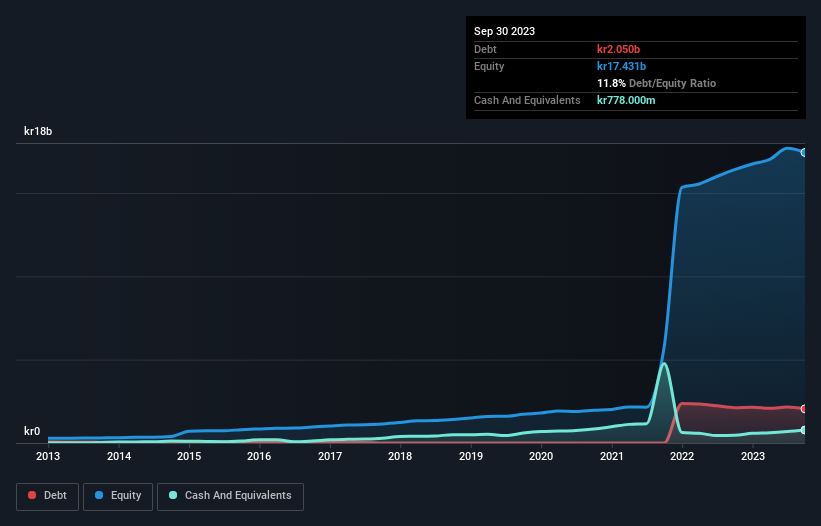
The external fund manager backed by Berkshire Hathaway's Charlie Munger, Li Lu, makes no bones about it when he says 'The biggest investment risk is not the volatility of prices, but whether you will suffer a permanent loss of capital.' When we think about how risky a company is, we always like to look at its use of debt, since debt overload can lead to ruin. Importantly, Vitrolife AB (publ) (STO:VITR) does carry debt. But should shareholders be worried about its use of debt?
When Is Debt Dangerous?
Debt assists a business until the business has trouble paying it off, either with new capital or with free cash flow. Part and parcel of capitalism is the process of 'creative destruction' where failed businesses are mercilessly liquidated by their bankers. However, a more common (but still painful) scenario is that it has to raise new equity capital at a low price, thus permanently diluting shareholders. Of course, the upside of debt is that it often represents cheap capital, especially when it replaces dilution in a company with the ability to reinvest at high rates of return. When we think about a company's use of debt, we first look at cash and debt together.
See our latest analysis for Vitrolife
How Much Debt Does Vitrolife Carry?
As you can see below, Vitrolife had kr2.05b of debt, at September 2023, which is about the same as the year before. You can click the chart for greater detail. On the flip side, it has kr778.0m in cash leading to net debt of about kr1.27b.

How Strong Is Vitrolife's Balance Sheet?
Zooming in on the latest balance sheet data, we can see that Vitrolife had liabilities of kr596.0m due within 12 months and liabilities of kr3.15b due beyond that. Offsetting these obligations, it had cash of kr778.0m as well as receivables valued at kr535.0m due within 12 months. So its liabilities outweigh the sum of its cash and (near-term) receivables by kr2.44b.
Given Vitrolife has a market capitalization of kr20.8b, it's hard to believe these liabilities pose much threat. However, we do think it is worth keeping an eye on its balance sheet strength, as it may change over time.
In order to size up a company's debt relative to its earnings, we calculate its net debt divided by its earnings before interest, tax, depreciation, and amortization (EBITDA) and its earnings before interest and tax (EBIT) divided by its interest expense (its interest cover). Thus we consider debt relative to earnings both with and without depreciation and amortization expenses.
With net debt sitting at just 1.2 times EBITDA, Vitrolife is arguably pretty conservatively geared. And this view is supported by the solid interest coverage, with EBIT coming in at 7.1 times the interest expense over the last year. On top of that, Vitrolife grew its EBIT by 32% over the last twelve months, and that growth will make it easier to handle its debt. When analysing debt levels, the balance sheet is the obvious place to start. But it is future earnings, more than anything, that will determine Vitrolife's ability to maintain a healthy balance sheet going forward. So if you want to see what the professionals think, you might find this free report on analyst profit forecasts to be interesting.
Finally, while the tax-man may adore accounting profits, lenders only accept cold hard cash. So we clearly need to look at whether that EBIT is leading to corresponding free cash flow. Over the last three years, Vitrolife recorded free cash flow worth a fulsome 88% of its EBIT, which is stronger than we'd usually expect. That positions it well to pay down debt if desirable to do so.
Our View
Happily, Vitrolife's impressive conversion of EBIT to free cash flow implies it has the upper hand on its debt. And that's just the beginning of the good news since its EBIT growth rate is also very heartening. Overall, we don't think Vitrolife is taking any bad risks, as its debt load seems modest. So we're not worried about the use of a little leverage on the balance sheet. Another factor that would give us confidence in Vitrolife would be if insiders have been buying shares: if you're conscious of that signal too, you can find out instantly by clicking this link.
If, after all that, you're more interested in a fast growing company with a rock-solid balance sheet, then check out our list of net cash growth stocks without delay.
New: Manage All Your Stock Portfolios in One Place
We've created the ultimate portfolio companion for stock investors, and it's free.
• Connect an unlimited number of Portfolios and see your total in one currency
• Be alerted to new Warning Signs or Risks via email or mobile
• Track the Fair Value of your stocks
Have feedback on this article? Concerned about the content? Get in touch with us directly. Alternatively, email editorial-team (at) simplywallst.com.
This article by Simply Wall St is general in nature. We provide commentary based on historical data and analyst forecasts only using an unbiased methodology and our articles are not intended to be financial advice. It does not constitute a recommendation to buy or sell any stock, and does not take account of your objectives, or your financial situation. We aim to bring you long-term focused analysis driven by fundamental data. Note that our analysis may not factor in the latest price-sensitive company announcements or qualitative material. Simply Wall St has no position in any stocks mentioned.
About OM:VITR
Vitrolife
Provides assisted reproduction products in Europe, the Middle East, Africa, Asia-Pacific, and the Americas.
Undervalued with adequate balance sheet.
Similar Companies
Market Insights
Community Narratives



